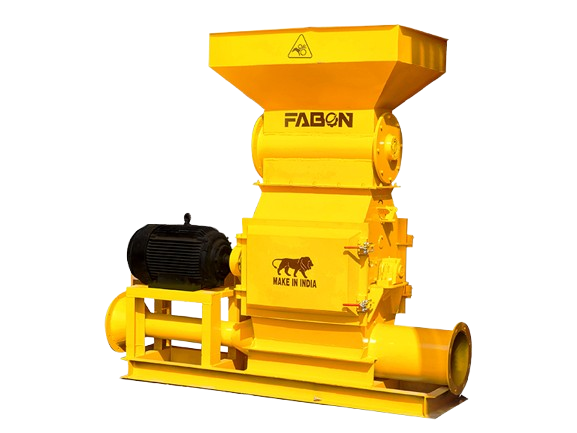
🔨 Crushing Power, Engineered for Performance: Hammer Mill by Fabon Engineering, Nashik
In the world of biomass, agro-waste processing, and material size reduction, Fabon Engineering Pvt. Ltd. brings industrial-grade efficiency and durability with its robust range of Hammer Mills. Built to handle a wide variety of raw materials and harsh operating environments, Fabon’s Hammer Mills are trusted by businesses across India for their consistency, performance, and low operational cost.
Whether you’re in biomass pellet manufacturing, animal feed production, or agro-industrial processing, this machine is your essential tool for uniform particle size reduction and raw material preparation.
⚙️ What is a Hammer Mill?
A hammer mill is a machine designed to pulverize and grind bulk materials like wood chips, agricultural residue, grains, and biomass into fine powder or granules using high-speed rotating hammers. It’s a critical component in industries that require consistent input material for further processing such as:
Pellet plants
Briquette units
Animal feed mills
Fertilizer production
Herbal processing units
🛠️ Key Features of Fabon’s Hammer Mill
🪓 High-Speed Rotor with Hardened Hammers
Designed for efficient crushing of wood, husk, shells, and stalks.🌀 Heavy-Duty Construction
Rigid steel frame with anti-vibration mounts for durability and stable operation.🧹 Dust-Free Operation
Equipped with cyclone separators and optional bag filters for clean processing.🎚️ Adjustable Output Size
Interchangeable screens allow for variable granule size, from coarse to fine.🧑🔧 Easy Maintenance
Quick-access panels and bolt-on components for fast servicing and blade replacement.
📊 Technical Specifications (Sample Models)
| Model | Capacity | Power (HP/kW) | Output Size | Application |
|---|---|---|---|---|
| HM-500 | 500 – 800 kg/hr | 10 – 15 HP | 3–10 mm | Biomass, grains |
| HM-1000 | 1 – 1.5 TPH | 20 – 30 HP | 1–8 mm | Agro-waste |
| HM-2000+ | 2 – 3 TPH | 40 – 60 HP | Customizable | Commercial use |
Custom sizes and mobile hammer mill options are also available.
🌿 Compatible Raw Materials
Fabon’s Hammer Mill can efficiently grind:
Sawdust and wood chips
Coconut husk and shells
Sugarcane bagasse
Rice husk and wheat straw
Corn stalks and maize cobs
Neem leaves and herbs
Grains, pulses, and spices
🌱 Where It’s Used
Biomass Pellet & Briquette Plants
Animal & Poultry Feed Mills
Organic Fertilizer Production
Pharmaceutical and Herbal Processing
Composting and Waste Management Facilities
🇮🇳 Why Choose Fabon Engineering?
🏭 Made in India, Built for India: Rugged machinery designed for diverse raw materials
🧑🔧 Complete Turnkey Support: Installation, training, maintenance & AMC
⚙️ Custom Engineering: Tailored blade configurations and screen sizes
📞 Reliable After-Sales Support: Quick access to spare parts and service across India
🔨 Power Your Process with Precision
From pre-processing biomass to preparing animal feed, the Hammer Mill by Fabon Engineering is a workhorse that delivers high performance, low downtime, and long-term value. When you need power that performs — choose Fabon.
Would you like a matching FAQ or want this article turned into a printable brochure, catalog page, or social media post?
❓ FAQ: Hammer Mill by Fabon Engineering Pvt. Ltd., Nashik
1. What is a hammer mill used for?
A hammer mill is used to crush, grind, and pulverize materials into smaller particles using high-speed rotating hammers. It’s ideal for:
Biomass size reduction (for pellet or briquette production)
Animal & poultry feed processing
Herbal and agricultural product grinding
Organic fertilizer production
General waste management and composting
2. What materials can be processed in the Fabon Hammer Mill?
The hammer mill is designed to handle a wide variety of raw materials, including:
Sawdust and wood chips
Coconut shells and husk
Sugarcane bagasse
Rice husk and wheat straw
Corn stalks and maize cobs
Neem leaves, herbs, and spices
Grains, pulses, and agro-waste
3. What are the available capacities of Fabon’s Hammer Mills?
| Model | Capacity Range | Power Requirement |
|---|---|---|
| HM-500 | 500 – 800 kg/hr | 10 – 15 HP |
| HM-1000 | 1 – 1.5 TPH | 20 – 30 HP |
| HM-2000+ | 2 – 3 TPH | 40 – 60 HP |
Custom sizes and configurations are available on request.
4. Is the output particle size adjustable?
Yes. The hammer mill comes with interchangeable perforated screens that allow you to control the final particle size (typically ranging from 1 mm to 10 mm, or customized).
5. Does it produce a lot of dust? How is it controlled?
The Fabon Hammer Mill is equipped with:
Cyclone separator (standard)
Optional bag filter unit
Dust-proof housing
These systems significantly minimize dust emissions, ensuring a clean working environment.
6. Can the hammer mill be integrated into a pellet or briquette plant?
Yes. Fabon’s hammer mills are integration-ready and commonly used as a pre-processing unit in:
Biomass pellet lines
Briquetting systems
Animal feed plants
Organic fertilizer units
7. What safety features are provided?
Emergency stop switch
Overload protection
Safety covers for moving parts
Vibration-damping mounts to reduce operational hazards
8. Is the machine easy to maintain?
Yes. Fabon’s hammer mills are designed with:
Quick-access maintenance doors
Bolt-on hammer blades for easy replacement
Minimal moving parts for lower maintenance cost
9. What power source is required to run the hammer mill?
The hammer mill runs on a three-phase electric motor (industrial power supply). Diesel engine or PTO (tractor-driven) versions are available for off-grid or mobile operations.
10. What support does Fabon provide after purchase?
Fabon Engineering offers:
On-site installation and commissioning
Operator training and maintenance guidelines
AMC (Annual Maintenance Contracts)
Prompt spare parts availability
Remote and on-site technical support across India

